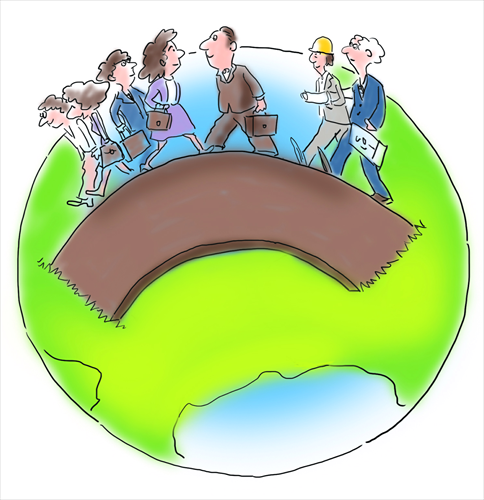HOME >> OP-ED
Pakistan welcomes corridor to China
Source:Global Times Published: 2016-4-6 22:18:01

Illustration: Liu Rui/GT
Although treasured as an "all-weather friendship" and an "iron brotherhood," the Sino-Pakistani relationship does not really live up to this reputation in economic terms. For example, China only ranks 16th among all direct investors in Pakistan. However, the lopsidedness is expected to be rectified in the next ten years, as the China-Pakistan Economic Corridor (CPEC), a collection of projects that can immensely intensify the connection between both countries, is planned to be finished in 2025.
The $46 billion project has been described as a pivotal point in Sino-Pakistani relations. It was designed as part of China's "Belt and Road" mega-initiative, but aims at boosting the mutual benefits of both countries. Through the project, China can develop a much shorter, more cost-efficient and geopolitically safer route for imports and exports. In Pakistan, Chinese companies will find a huge and reliable market for infrastructure, goods and talent. For Pakistan, the CPEC will act as the main artery to re-vitalize the country's economy, especially in terms of energy and infrastructures. Given Pakistan's location at the intersection of Central, South and West Asia, the project will greatly ramp up Pakistan's leverage in the regional geopolitical landscape. The CPEC will be a game changer for Pakistan.
So far, the CPEC is proceeding well. Pakistan has placed an unprecedented emphasis and priority on the project, which is reflected by a unanimous agreement by all political forces in Pakistan, in spite of the country's multi-party democratic system.
There was a heated debate in Pakistan about the CPEC, which aroused some concerns in China. However, the disagreement is not about the feasibility of the project, but how to divide the big cake as all regions in Pakistan want to maximize their profits from the project. This is quite common for a multi-party country.
Attaching great importance to the project might have left the impression to the public that Pakistan is too reliant on the CPEC, and some might wonder what if the project fails. Such concerns are quite speculative, without solid evidence. I don't see any risks that could lead to the collapse of the project. Both countries are eager to increase their connectivity in multiple spheres, and what one side offers can exactly tally with what the other side wants. There are no conflicts of interest between China and Pakistan on the project.
We cannot deny that the possibility of side effects exists during the implementation of a mega project like the CPEC. For example, environmental concerns exist as both sides are engaged in gigantic cross-border infrastructure projects, Chinese products, by relying on their competitive advantage, could impact Pakistani brands, and security issues might make Chinese companies think twice before getting involved.
But these concerns have been informed and shared by the leadership of both countries at the initial stage of the implementation of the CPEC. Political consensus over mutual concerns could result in constructive official involvement in specific problems. For example, we have agreed that Chinese companies should be encouraged to transfer certain technology to Pakistan in exchange for more shares in the Pakistani market. In joint ventures, Pakistan should hold a certain percentage of shares so that cooperation is on an equal footing. And Pakistan will continue deploying elite squads to protect the route.
These agreements for actual reciprocity are essential to the smooth operation of the CPEC. The mechanism, which is established on the basis of the special relationship between Pakistan and China, is unique and will guarantee the success of the project.
The CPEC will probably form a new regional geopolitical dynamic. We hope that certain countries that hold a narrow-minded perspective on the project could change their mind, and engage in the project as a constructive player. In this way, the CPEC can yield the greatest profits for all stakeholders.
The article was compiled by Global Times reporter Liu Zhun based on an interview with Ahsan Iqbal, Minister of Planning, Reform and Development in Pakistan. He is in charge of the China-Pakistan Economic Corridor project. liuzhun@globaltimes.com.cn Follow us on Twitter @GTopinion
Posted in: Viewpoint